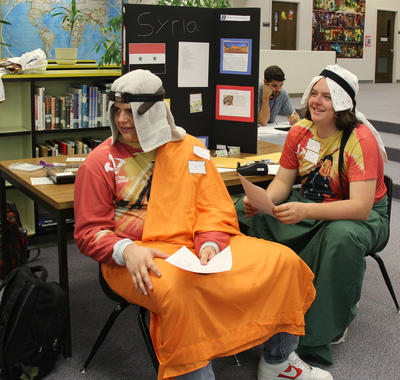New Zealanders Dristi and Lizbeth had a lot of money available for foreign aid, and they used it cunningly and effectively to trade for commodities and services from countries around the world. Dristi and Lizbeth are Wenatchee High School senior Dristi Pandit and freshman Lizbeth Najera Gutierrez, and they were New Zealanders for a day during a complex economic simulation called The International Economic Mini-Summit on May 24th.
The Summit is a hands-on, activity-based learning program developed by Boise State University that teaches the significance and the basic concepts of globalization and international economics. Students gain a multi-cultural understanding of how the world works and what they can do to prepare.
“Students over the semester have created a strategy on how to improve the economy of their assigned country,” said business teacher Jeff Leavitt, who included the summit as part of his Economics class. “They're implementing that strategy in a simulated economic summit that involves global proposals. It involves imports and exports—supply and demand. It involves debating and currency exchanges, absolute advantage, comparative advantage—all those economic concepts, and globalization.
“It's a competition, so they're trying to win, but it's also a game,” Leavitt explains. “They're trying to help everybody raise the economy of their countries, and yet still come out on top. There’s wheeling and dealing, some bartering, some bribery. It's pretty fun.”
“It was very stressful but at the same time it was very fun,” said junior Nancy Gutierrez. “I learned a lot about trade and demand. I had heard about it, but before this I didn't know exactly how it worked. This class, it's opened my eyes to a lot of things in economics.”
Students weren’t the only ones playing roles in this game. Mike Wilson and Mindi Doré were bankers for the countries. Wilson explained that countries traded currencies and  tickets with other countries in exchange for commodities, like long term development cards, that would earn the team points for creating an economically robust country. Countries could also take out loans. “They’ve done a good job making it fun for students,” said Wilson, “but it’s complex. It’s a very real simulation.”
tickets with other countries in exchange for commodities, like long term development cards, that would earn the team points for creating an economically robust country. Countries could also take out loans. “They’ve done a good job making it fun for students,” said Wilson, “but it’s complex. It’s a very real simulation.”
“Students are not just simply learning economics from a textbook,” said Leavitt. “They’re actually doing economics, not just learning about it.”
Bankers also judged country-appropriate costumes, visual displays and, along with scorekeepers Michelle Mahoney-Holland and Tami McBride judged debates. Quiz manager Gabe Cline offered quizzes as a way to earn extra currency for each country.
Student teams chose the countries of Paraguay, Switzerland, New Zealand, Jordan, Nepal, Azerbaijan and Syria, although there were 117 countries in the Summit program database to choose from.
PHOTO: Syria — Mason Kyser and Aidan Travis — took the top honors for the day.
“I loved it,” said senior Dristi Pandit, a member of the New Zealand team. “It's so nice to not just read out of a textbook, but experience it firsthand. Seeing how we interact, and how we can come together, and help each other, and not just compete is really cool.”
Leavitt also hopes to expand the competition beyond the high school. “There's a huge economic summit at Boise State every year, involving about 500 students. At some point, I would like to take Wenatchee students and see how we compete against other northwest schools.”
